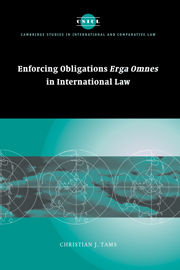Book contents
Introduction
Published online by Cambridge University Press: 24 July 2009
Summary
On 5 February 1970, after international legal proceedings spanning twelve years, and more than two decades after the dispute had arisen, the President of the International Court of Justice, Judge Bustamante y Rivero, read out the Court's judgment in the Case Concerning the Barcelona Traction, Light and Power Co., Ltd. In that judgment, the Court held that, under international law, the nationality of corporations depended on national incorporation rules and that the violation of shareholders' rights did not normally constitute a separate breach of international law. The Barcelona Traction, Light and Power Co., having been incorporated under Canadian law, therefore was to be treated as Canadian, although 88 per cent of its shares were held by Belgian shareholders, and Belgium could not espouse claims of diplomatic protection. Highly controversial at its time, this holding remains the crucial judicial pronouncement on the nationality of corporations to date.
A quick glance at the textbooks, however, reveals that Barcelona Traction is more than a controversial decision on the question of diplomatic protection of corporations. Two paragraphs of the judgment have taken on a life of their own and have inspired much discussion among States, courts, commissions, and commentators. Although they did not affect the rules of nationality, nor indeed any other central aspect of the case before the Court, these two paragraphs are among the most famous judicial pronouncements in the ICJ's history. Since they provide the starting-point of the present study, they merit to be quoted in full.
- Type
- Chapter
- Information
- Publisher: Cambridge University PressPrint publication year: 2005

